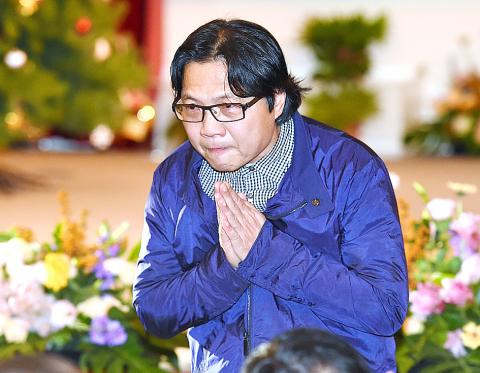A group of academics yesterday launched a petition to request that the Ministry of Education revoke its decision to appoint National Taiwan University (NTU) professor Kuan Chung-ming (管中閔) as the university’s president.
Among the academics were Academia Sinica academicians Chen Lan-bo (陳良博) and Chou Chang-hung (周昌弘), NTU professor Jang Show-ling (鄭秀玲), NTU professor emeritus Ho De-fen (賀德芬), NTU adjunct professor Chang Ching-hsi (張清溪) and Taiwan Association of University Professors president Lin Hsiu-hsin (林秀幸).
Although the Executive Yuan said that it cannot revoke the ministry’s decision to appoint Kuan, there are “valid legal means” to do so, they said in a joint statement.

Photo: Liao Chen-huei, Taipei Times
Kuan was elected NTU president on Jan. 5 last year and was originally scheduled to take office the next month, but the ministry in May demanded a re-election on the grounds that Kuan failed to disclose a possible conflict of interest in the election, as he served as an independent director at Taiwan Mobile Co and company vice president Richard Tsai (蔡明興) sat on the election committee.
Former minister of education Yeh Jiunn-rong (葉俊榮), who took office in July, initially instructed the university to redo parts of the election without Tsai to correct what he called a “procedural flaw” in the process.
However, after the university repeatedly refused, citing a lack of legal basis, Yeh on Monday last week announced that he would “reluctantly agree” to Kuan’s appointment and ordered the university to submit a report reviewing the controversies that arose during the presidential election.
He tendered his resignation the following day after the decision drew a backlash.
Yeh’s announcement came just two days before the Executive Yuan rejected three administrative appeals filed by the university, Kuan and a group of NTU students requesting that Kuan be appointed based on their interpretation of the law.
Yeh must have known that the Executive Yuan would reject the appeals and decided to appoint Kuan in advance without the approval of Premier William Lai (賴清德), the academics said yesterday.
While Yeh’s behavior was “extremely ridiculous,” what they found “most regrettable” was the Executive Yuan’s claim that Kuan’s appointment cannot be revoked, they said.
Article 117 of the Administrative Procedure Act (行政程序法) stipulates that government agencies and their superior authorities can revoke a previously issued administrative injunction that is found to be illegal and falls within their jurisdiction, they added.
As an NTU presidential candidate has filed an administrative appeal against the Executive Yuan over Kuan’s appointment, the ministry should review whether its decision to appoint him is legal, as stipulated in Paragraph 2, Article 58 of the Administrative Appeal Act (訴願法), and revoke the decision, the academics said, referring to an administrative appeal filed by NTU professor Wu Ruey-beei (吳瑞北) on Friday last week.
Meanwhile, Yeh has contravened the Public Functionary Service Act (公務員服務法), which bans civil servants from contradicting a superior’s instructions that fall within their jurisdiction and promoting the personal interests of themselves or others by abusing their position, they said.
By “debunking the government’s lies” about the appointment being irreversible, the academics said that they hope more people would join their call to revoke Kuan’s appointment before he takes office on Tuesday next week.

DEFENSE: The National Security Bureau promised to expand communication and intelligence cooperation with global partners and enhance its strategic analytical skills China has not only increased military exercises and “gray zone” tactics against Taiwan this year, but also continues to recruit military personnel for espionage, the National Security Bureau (NSB) said yesterday in a report to the Legislative Yuan. The bureau submitted the report ahead of NSB Director-General Tsai Ming-yen’s (蔡明彥) appearance before the Foreign and National Defense Committee today. Last year, the Chinese People’s Liberation Army (PLA) conducted “Joint Sword-2024A and B” military exercises targeting Taiwan and carried out 40 combat readiness patrols, the bureau said. In addition, Chinese military aircraft entered Taiwan’s airspace 3,070 times last year, up about

The Overseas Community Affairs Council (OCAC) yesterday announced a fundraising campaign to support survivors of the magnitude 7.7 earthquake that struck Myanmar on March 28, with two prayer events scheduled in Taipei and Taichung later this week. “While initial rescue operations have concluded [in Myanmar], many survivors are now facing increasingly difficult living conditions,” OCAC Minister Hsu Chia-ching (徐佳青) told a news conference in Taipei. The fundraising campaign, which runs through May 31, is focused on supporting the reconstruction of damaged overseas compatriot schools, assisting students from Myanmar in Taiwan, and providing essential items, such as drinking water, food and medical supplies,

STRICTER ENFORCEMENT: Taipei authorities warned against drunk cycling after a sharp rise in riding under the influence, urging greater public awareness of its illegality Taipei authorities have issued a public warning urging people not to ride bicycles after consuming alcohol, following a sharp rise in riding under the influence (DUI) cases involving bicycles. Five hundred and seven people were charged with DUI last year while riding YouBikes, personal bicycles, or other self-propelled two-wheelers — a fourfold increase from the previous year, data released by the Taipei Police Department’s Traffic Division showed. Of these, 33 cases were considered severe enough to be prosecuted under “offenses against public safety,” the data showed. Under the Road Traffic Management and Penalty Act (道路交通管理處罰條例), bicycles — including YouBikes and other

A magnitude 4.3 earthquake struck eastern Taiwan's Hualien County at 8:31am today, according to the Central Weather Administration (CWA). The epicenter of the temblor was located in Hualien County, about 70.3 kilometers south southwest of Hualien County Hall, at a depth of 23.2km, according to the administration. There were no immediate reports of damage resulting from the quake. The earthquake's intensity, which gauges the actual effect of a temblor, was highest in Taitung County, where it measured 3 on Taiwan's 7-tier intensity scale. The quake also measured an intensity of 2 in Hualien and Nantou counties, the CWA said.